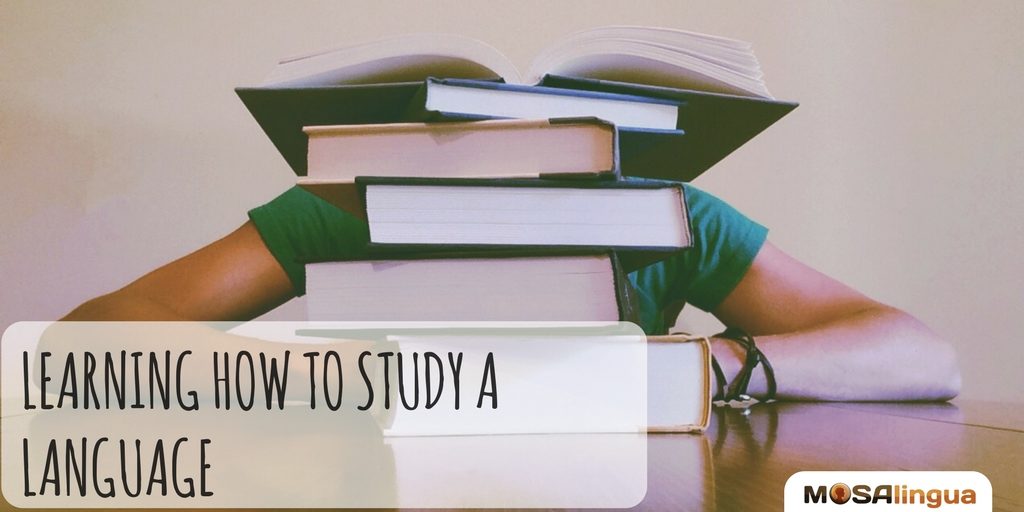Usually our learning material is based on short, succinct lessons which follow a time effective method. But today I’d like to focus on the other side of language learning: how to actually study a language. As you may well know, there is no magic formula for becoming fluent in another language. Schools and online resources employ a countless number of methods which may work great for some but not as well for others.

Personally, I’ve found great success learning French and Spanish in a more traditional setting, and I’ve learned that it’s important to:
Define a Goal
A predetermined goal is the main thing that keeps you motivated and focused on what you’ve started. But the key to setting a reachable goal is setting an appropriate timeframe. Sure, you won’t reach a new level in only a couple of months. Experts say even becoming proficient can take over a year with intensive studies of four to five hours a day.
Example: An international language exam is a great goal. It sets a benchmark for the level you need to reach or exceed. In this last case, you need to create at least a year-long program for studying for this exam. You can also take it a step further and set a goal to begin a postgraduate course or look for a job abroad.
Establish a Study Routine
Trust me, I know most people run from the word routine, and I’m one of them. But to make noticeable strides towards your professional or personal goals to study a language, consistent work is hands down the most effective method.
Example: Depending on your schedule, set aside one to two hours to intensively study a language. Don’t give up it if it seems too disciplined at first. Keep in mind that when we perform an activity on a daily basis for more than 15 days, it becomes routine. Just keep your nose to the grindstone, and after a while studying will become almost automatic.
Be Strict
It’s important to find worthy learning material — books, apps, workbooks, and flashcards all work well. If you really want to go for the traditional approach, try emulating a college level course by looking up syllabuses online. It’s also key to realize exactly what your level is. If you’re a beginner, try to model your study sessions after intro classes or beginner textbooks. This is why you must not short yourself with cheap resources. Make sure you find quality material that is adapted to your needs and interests. It’s hard to learn when your program is based off resources that don’t address all of the areas you need to improve.
Example: Give yourself the advantage, today they are tons of free resources on the Internet, the MosaLingua app being one to learn French, Portuguese, Italian and Spanish. Use resources like MosaLingua which were developed by linguists and language instruction experts. The methodology that the app uses will improve your vocabulary, your usage of grammatical structures and your ability to understand spoken conversation thanks to the dialogues.
Develop all of Your Language Skills
Personally, I’ve found prep material for international exams to be very effective. In our article on international Italian exams, we go over some study tips that apply to any language. The prep materials focus on the four main language skills: reading, writing, speaking and understanding. If are going for an international qualification you will need more than just a prep book. Make sure you cover all your bases and get audio material as well.
Example: In your routine of two hours, devote 30 minutes to each skill. Once you feel like you’ve made real progress — and I mean real, like mastering the verb tenses (in form and in usage), being to understand about 85% of what you hear and speaking fluidly — it’s time to reassess your skills and adjust accordingly to reach the next level.
I hope you find it a rewarding experience to study a language more traditionally!
Related posts:
Start learning a new language today

Good news: we can help!
More good news: you can get started for free! Start your free trial now and for the next 15 days, take advantage of the most effective language learning method on the market!
Vocabulary flashcards, videos with subtitles, audiobooks, articles adapted to your level – with MosaLingua Premium (Web & Mobile), you’ll have access to all this and more. Get started right now. It’s free—and risk-free—to try!








I really want to learn how to learn Spanish soon. So, I liked what you said about how you need to define a goal for yourself. I think a good goal for myself would be to be able to speak Spanish well.